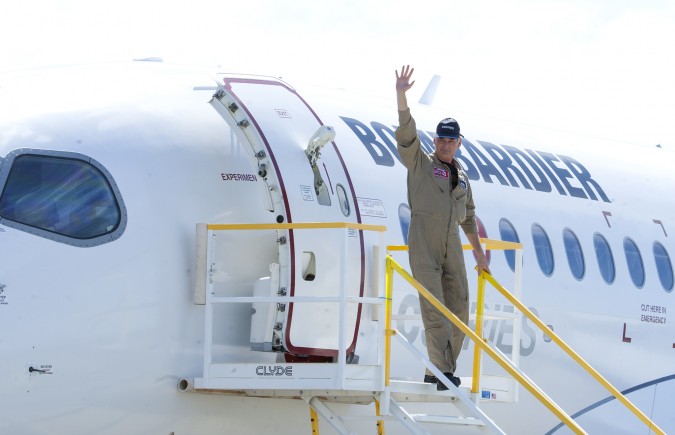MONTREAL – With Bombardier’s CSeries back in the air for the first time in more than three months, pressure will now be on the Montreal company to meet the aircraft’s delivery schedule and sign up new orders.
The plane took to the air Sunday for the first time since an engine failure during ground maintenance testing on May 29.
The CS100 plane flew about 30 minutes at Bombardier’s facility in Mirabel, near Montreal. Additional flights are slated to take place in the coming days with the plane possibly moving to Wichita, Kan., for more testing.
The manufacturer said it’s confident the CS100 aircraft will enter into service in the second half of 2015, with the larger CS300 following about six months later.
Benoit Poirier of Desjardins Capital Markets said Bombardier can still meet its delivery schedule if flight tests resume Sept. 15 for the third and fourth test aircraft, and Oct. 15 for the plane whose carbon fibre wing was damaged by the engine failure. He anticipates a Nov. 1 first flight of the fifth test aircraft. The analyst said each plane is expected to undergo 40 hours of flight testing per month.
“We also believe that some potential orders were pending the resumption of the flight testing,” he wrote Monday in a report.
Bombardier (TSX:BBD.B) has 203 firm orders for the CSeries and hopes to reach 300 before it makes its first delivery. Including the 203 orders, it has 513 total commitments.
Bombardier spokeswoman Marianella de la Barrera acknowledged that some customers were taking a “wait-and-see approach” given the pause in test flights. Yet others signed letters of intent at the Farnborough Airshow in July.
“So the momentum is still there, the interest is of course still there and we do believe that some of these customers that were taking a wait and see approach will be stepping up,” she said in an interview.
Walter Spracklin of RBC Capital Markets said the resumption of flight tests should warm up his “new order heat gauge.”
“While Bombardier remains only at the early stages of flight test hours, we believe the positive sentiment around flight test resumptions, as well as greater visibility towards performance data certification, should translate into improving sales campaigns,” he wrote in a report.
The analyst said the most likely new orders will come from Dublin-headquartered CityJet for up to 30 aircraft valued at about US$2.3 billion, and China Express for more than 20 aircraft worth more than US$1.4 billion.
Spracklin said other potential customers are Libyan Airlines, Abu Dhabi-based charter carrier Royal Jet and West African carrier Arik Air.
David Tyerman of Canaccord Genuity said the resumption of flight testing could help Bombardier’s share price over the next year, accelerating orders as it surpasses performance milestones and the aircraft approaches commercial service. Bombardier anticipates the CSeries could generate US$5 billion to US$8 billion in additional annual revenue at full production, likely three years after entry into service.
“However, we caution that this story may unfold slowly, given the long timeframes of Bombardier’s new-product strategy and uncertain margin improvement timeframes,” he wrote in a report.
Swedish company Braathens Aviation (Malmo) said last month it no longer wants to be the first recipient of the aircraft due to uncertainty surrounding the program, but did not cancel its order for five CS100 and five CS300 models.
Some analysts expect deliveries could be delayed until the first half of 2016. The CSeries program has eaten through much of its buffer and there remains a potential for other problems to surface, especially when the plane flies in “normal mode” using its fly-by-wire computer system.
Before flight tests resumed, the plane had completed 330 hours of the 2,400 hours of flight tests required to win certification from Transport Canada.
Bombardier has not disclosed the cause of the engine failure but said the CSeries program has made headway in recent months by completing a series of activities including additional ground tests and software upgrades.
Meanwhile, de la Barrera confirmed that Bombardier and Chinese aircraft manufacturer Comac won’t pursue cockpit commonality between the CSeries and the larger C919, which is later in development. She said studies continue on other common features between the aircraft, along with collaborative efforts on other fronts including sales, marketing, customer service.
On the Toronto Stock Exchange, Bombardier’s shares gained three cents at C$3.66 in Monday morning trading.
